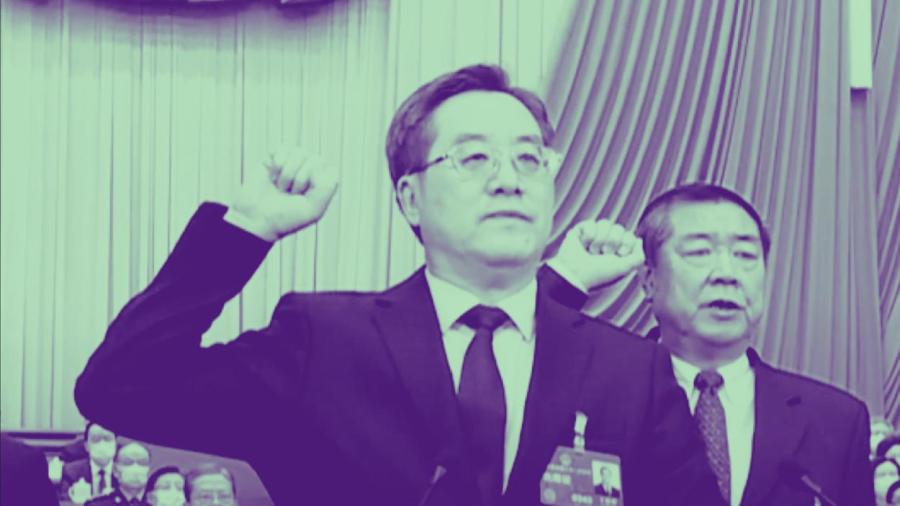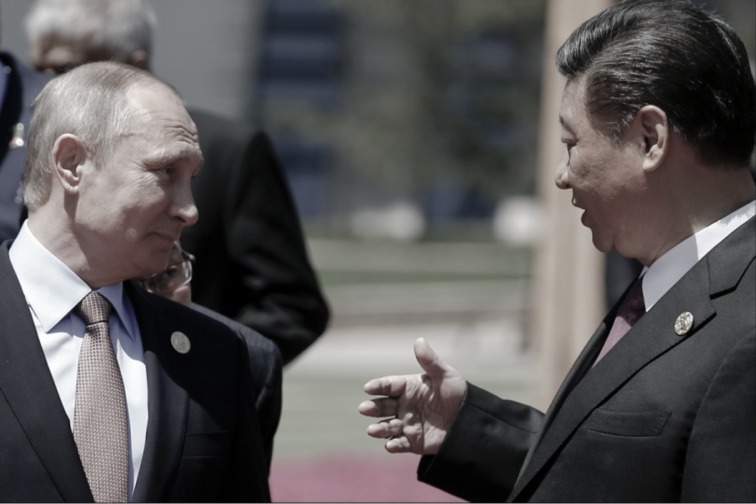Ding Xuexiang, Member of the CCP Politburo Standing Committee and Vice Premier of the State Council. (Video screenshot)
[People News] The Chinese Communist Party’s (CCP) senior leadership’s “Beidaihe time” seems to be proceeding quietly, yet explosive inside information is circulating widely. Du Wen — a self-media commentator and former executive director of the Legal Advisory Office of the Inner Mongolia Autonomous Region Government — has received word that the Beidaihe meeting finalised the CCP’s No. 1 and No. 2 successors: Ding Xuexiang and Chen Jining. They are to take over the posts of General Secretary and Premier, respectively.
At the start of Beidaihe, Du Wen said on his program “An Insider’s Perspective on China” that this was not an ordinary summer meeting, but the most critical 20 days for determining China’s fate. According to him, the Beidaihe Conference would decide the leadership lineup for the CCP’s 21st Party Congress in 2027.
Du revealed that the No. 1 successor decided upon was current Politburo Standing Committee member and First Vice Premier Ding Xuexiang, who would succeed as General Secretary. The No. 2 successor was current Shanghai Party Secretary and Central Committee member Chen Jining, who would succeed as Premier.
As the designated No. 1 successor, Ding Xuexiang has long been one of the most rumoured candidates to replace Xi Jinping. Based on various information he has received, Du judged that if Xi decides at this Beidaihe meeting to retire fully or partially in 2027, Ding Xuexiang will be the one to take over in whole or in part.
Du believes Ding is highly likely to become Xi’s “Hua Guofeng.” If Xi steps down or dies, Ding will inherit all of Xi’s policies and lines and will fully preserve and continue Xi’s political legacy. The personality cult and policies established under Xi would very likely be carried forward in Ding’s early period in office as though they were sacred edicts.
However, Du also stressed that history often unfolds with dramatic twists. Hua Guofeng, though once holding supreme power and chanting the “Two Whatevers” line, was quickly sidelined by Deng Xiaoping’s campaign proclaiming “practice is the sole criterion for testing truth.” Could such a script reappear? Might Ding face challenges from other factions within the Party?
The No. 2 successor, Chen Jining, is seen as the next Premier. Reportedly, during Xi’s trip to Shanghai in May this year, Xi personally appointed Chen as the future Premier of the State Council.
Du stated that reliable sources told him Chen was not invited to Beidaihe for vacation and summer respite; instead, he was instructed to remain in Shanghai to “hold the fort.” This means he can only be the No. 2 successor at most. Meanwhile, Ding Xuexiang, the No. 1 successor, has remained by Xi’s side.
Du also said that if Xi has made the decision at Beidaihe, then two years later, Chen Jining will either replace Li Qiang as Premier or become Executive Vice Premier. The authorities would not formally notify Chen personally, but unless something unexpected happens, the news would soon reach his ears — though Chen would dutifully pretend not to know.
Public records show Chen studied in the UK for a full ten years, giving him fluent English and familiarity with Western ways of thinking.
Why is Chen Jining the No. 2 successor?
Du analysed that first, his background and career path allow him to navigate multiple factions. He was promoted by Chen Xi and the Tsinghua clique and has close ties with Cai Qi, a heavyweight in the Fujian faction. Moreover, he has good relations with both the Jiang Zemin and Hu Jintao factions, having been promoted by them. His multiple factional ties make him a compromise candidate — a key figure for factional balance.
Second, his professional background is outstanding.
Third, his English proficiency and overseas experience make him the only top-level central official who can directly converse with Western leaders without a translator. This is a major advantage for a future Premier handling foreign economic and diplomatic affairs.
American officials have privately said that negotiating with Chen is more efficient than going through an interpreter — an impression that would help ease U.S.-China tensions and attract foreign investment.
At the same time, Du emphasised that Chen should not be mistaken for a reformist or liberal. A more accurate description is that he is a technocrat trained by the CCP, well aware of how to operate within the Party’s power system.
If Chen becomes Premier, Du sees three noteworthy potential changes:
-
Environmental protection and science/technology issues would gain prominence, and sustainable development might receive more resources.
-
Economic policy might tilt slightly toward market orientation and openness, with Shanghai’s model possibly expanded nationwide.
-
Professional communication ability with the West would improve, especially in areas like technology, climate, and trade rules.
However, Du stressed that all this would still operate within the existing political framework, and Chen would find it hard to break fundamental political limits.
Meanwhile, there are rumours of a “successor list” from the anti-Xi camp. Reportedly, Party elders like Wen Jiabao have proposed former Politburo Standing Committee member and Vice Premier Wang Yang as General Secretary, and Hu Chunhua as Premier, with current Central Military Commission Vice Chairman Zhang Youxia — who controls significant military power — giving his approval.
Observers believe that regardless of whether Xi Jinping steps down at the Fourth Plenary Session or at the 21st Party Congress, the fact that “successor lists” are widely circulating shows that Xi’s power is being broadly questioned. As the supreme leader, Xi’s personal ability, decision-making, and governing style have a major impact on the regime’s stability and continuity. Lacking competence yet fond of micromanaging, Xi has made serious policy blunders, bringing disaster to the nation and people. His dictatorship has lost popular support. In the process of the CCP dynasty’s collapse, Xi is not only playing the role of “Chief Accelerator” — he may also be the Party’s “gravedigger.”
(First published by People News) △











News magazine bootstrap themes!
I like this themes, fast loading and look profesional
Thank you Carlos!
You're welcome!
Please support me with give positive rating!
Yes Sure!